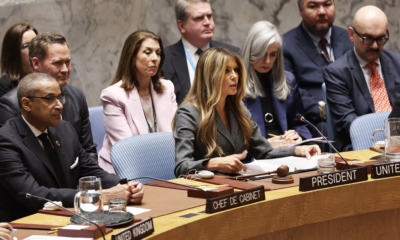Trump Presidency
Trump Targets Intel CEO Lip-Bu Tan Over Alleged China Links, Calls for Immediate Resignation
Lip-Bu Tan, a naturalized U.S. citizen born in Malaysia and raised in Singapore, is a renowned figure in the semiconductor industry. Prior to Intel, he led Cadence Design Systems, which pled guilty to export violations involving a Chinese military-linked university.
President Donald Trump has unleashed a political firestorm by publicly demanding the resignation of Intel CEO Lip-Bu Tan, accusing him of being “highly conflicted” due to alleged ties with Chinese military-linked firms. The call comes just months after Lip-Bu Tan took the helm at Intel, one of America’s most strategic tech companies, with the mandate to restore its global chip dominance.
Trump’s statement, posted on his Truth Social platform, reads: “The CEO of INTEL is highly CONFLICTED and must resign, immediately. There is no other solution to this problem.”
This extraordinary demand sent Intel shares tumbling more than 3%, with markets reacting nervously to renewed tensions between business and the political establishment.
Allegations Surrounding Chinese Investments
Intel’s Lip-Bu Tan, a naturalized U.S. citizen born in Malaysia and raised in Singapore, is a renowned figure in the semiconductor industry. Prior to Intel, he led Cadence Design Systems, which pled guilty to export violations involving a Chinese military-linked university. Though Lip-Bu Tan wasn’t personally indicted, his past leadership and venture capital ties to over $200 million in investments in Chinese firms—some allegedly connected to the military—have raised red flags among lawmakers.
A 2024 Congressional report and an April 2025 Reuters investigation intensified scrutiny over Tan’s financial links to Chinese tech ventures. While U.S. laws don’t ban such investments outright, bipartisan sentiment in Washington is shifting toward decoupling from Chinese high-tech supply chains, particularly in sectors critical to national security like semiconductors.
The new CEO of @intel reportedly has deep ties to the Chinese Communists. U.S. companies who receive government grants should be responsible stewards of taxpayer dollars and adhere to strict security regulations. The board of @Intel owes Congress an explanation. pic.twitter.com/3rYhHge6Wa
— Tom Cotton (@SenTomCotton) August 6, 2025
Political Pressure Mounts
Republican Senator Tom Cotton and Trump ally Bernie Moreno echoed Donald Trump’s demand, citing Intel’s slow progress in U.S. manufacturing expansion despite receiving billions in federal subsidies under the CHIPS and Science Act.
Intel responded swiftly, stating: “Intel, the board of directors, and Lip-Bu Tan are deeply committed to advancing U.S. national and economic security interests.”
Intel added that it is making “significant investments” aligned with Trump’s “America First agenda” and emphasized Intel’s CEO Lip-Bu Tan’s commitment to Intel’s U.S.-based operations.
Strategic Tensions in the Chip War
Industry insiders suggestTrump’s move may be part of a broader campaign to pressure Intel amid reported negotiations involving a partnership with Taiwanese chipmaker TSMC—a move potentially at odds with his hardline push for domestic-only manufacturing.
Intel is central to U.S. efforts to regain semiconductor leadership, especially as rivals like TSMC and Samsung pull ahead in advanced chip technology. Tan’s forced exit could further destabilize the firm’s fragile recovery trajectory and raise doubts about America’s ability to build a secure, sovereign chip supply chain.
As Trump prepares for a return to the White House in 2025, his aggressive stance signals that tech leaders with any trace of China affiliations may find themselves in the crosshairs of Washington’s evolving economic warfare.











































